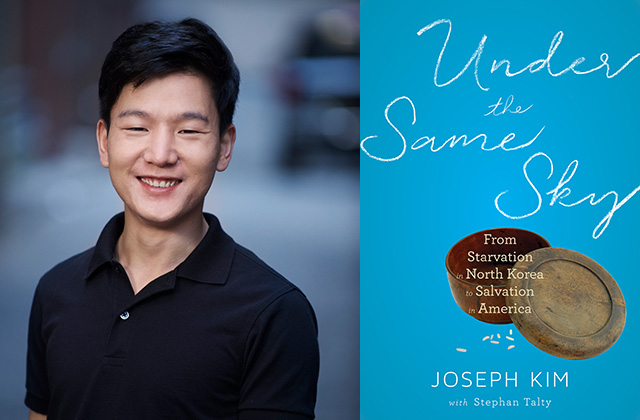by KARIN CHAN and JAMES S. KIM
After his father died due to starvation and his mother and sister left for China, Joseph Kim was left homeless as a child. He grew up learning to beg and even worked in a coal mine before he was finally able to escape to China himself at age 16, Kim recounts in a Reddit “Ask Me Anything” (AMA) session on Thursday.
Kim has since resettled in Richmond, Va., where he calls home. He graduated high school and is currently a university student working towards a degree in international relations. He continues to work closely with Liberty in North Korea (LiNK), a nonprofit that helps with rescuing and resettling refugees as well as raising awareness about the North Korean people.
He recorded his experiences in his memoir, Under the Same Sky: From Starvation in North Korea to Salvation in America, which chronicles his will to survive through harsh conditions and dangers of getting caught by the Chinese authorities.
Earlier this year, Kim spoke at a UN panel with other defectors to share their personal stories about North Korea’s human rights violations. Having grown up in North Korea during the ’90s famine, Kim also shared his story in a 2013 TedTalk about building a life for himself in America.
Below are some highlights from Kim’s AMA session. Kim’s responses have been edited for length and clarity.
On what led him to leaving North Korea:
I didn’t see much hope to survive in North Korea much longer because, at this point, I had lived on the street as a homeless kid for about three years. I could die of starvation like my father did, or try to escape North Korea for a better life.
On whether the average North Korean believes in the regime’s propaganda:
Well, it’s hard to say. Yes and no. Because if you’re talking about nowadays North Koreans, it’s a little bit hard for me to say that a majority of North Koreans believe propaganda.
But I do think that older generations definitely believe in the government propaganda because in the 1970s, the North Koreans were economically better off than South Korea. After the 1990s famine, things have proven that North Korea is not the best country in the world, as the government or state claims. Because how can you accept the propaganda when your best friend dies of starvation?
So I think nowadays, more and more people are critical of government propaganda, but I can’t say what all North Koreans do now.
On what he thought the U.S. looked like before moving to the country:
I expected coming to America, thinking that I would end up in New York, with tall buildings, but I ended up going to Richmond, Va., where I realized that I was almost in the middle of a forest.
The next morning I woke up, there was a deer around. That was confusing for me because the America I had imagined was a big city, with really tall buildings. I thought I did something wrong to be put in some other place.
His thoughts on moving from China to the United States:
Definitely, the language and cultures were the biggest obstacles, but what really struck me was not knowing what to do with my life. That was the hardest because in North Korea, my daily dream was to find food and have enough food. In some sense, food was the entire dream for me.
But coming to America, I think the food was provided, so in that sense, my dream was already achieved. So I didn’t really know what to look for afterwards. And a lot of people told me I had freedom to do everything, but nobody explained to me what freedom meant. So, I had to figure that out on my own. I think meeting new friends, and talking to older people, helped me.
What he believes has yet to be revealed about North Korea:
A lot. I mean, especially in the Western media. So much political conflicts and issues. Just about the leader.
But I think what we are really missing is that because of heavy subjects, we tend to forget that there are people like myself who have hopes and dreams for a better life. And people who want to be happy. But because of all those heavy subjects, I think we sometimes don’t get to see the average North Korean, and you can’t really connect or relate to them because of heavy subjects.
On pursuing a degree in international relations:
Studying for undergraduate, it can only give you some tools. But I don’t think I have the solution to make a better place for North Korea overnight. What I believe is that education will help me to be empowered and overcome those issues one day. But as of now, I don’t see much hope. One thing I can do is help make sure that we are prepared for ex-North Korea someday, with education.
On North Korean culture aspects he misses and learning what freedom meant:
That’s a bit of a tough question. I think one thing that I kind of miss is that back in North Korea, before the economic collapse, there was much more communal sharing. And I feel like everyone was really sharing with each other. I think North Koreans used to be more communal and family-oriented, celebrating the holidays together
When I was in China, I was offered to come to the U.S., and I said “no” because I was told that in North Korea, the U.S. is our enemy state and we have to destroy it someday. I asked [my pastor], “Why should I go to America?” and he said I could continue my education and have freedom. [The latter part] didn’t catch my ear because I knew what freedom was. But until he was elaborating what freedom was—[he said] I could go outside anytime I wanted to go out. When I was in China, I was hiding and stayed in an apartment for long [periods], so going outside was something luxurious. That was a real turning point for me.
You can read Joseph Kim’s full Reddit AMA here. You can also purchase his memoir Under the Same Sky through the LiNK Shop, Amazon and Barnes & Noble.
See Also
North Korean Defector Joo Yang Shares Eye-Opening Tales In Reddit AMA
DocKim Shares How He Escaped North Korea in the 1950s
___
Featured image courtesy of Houghton Mifflin Harcourt







